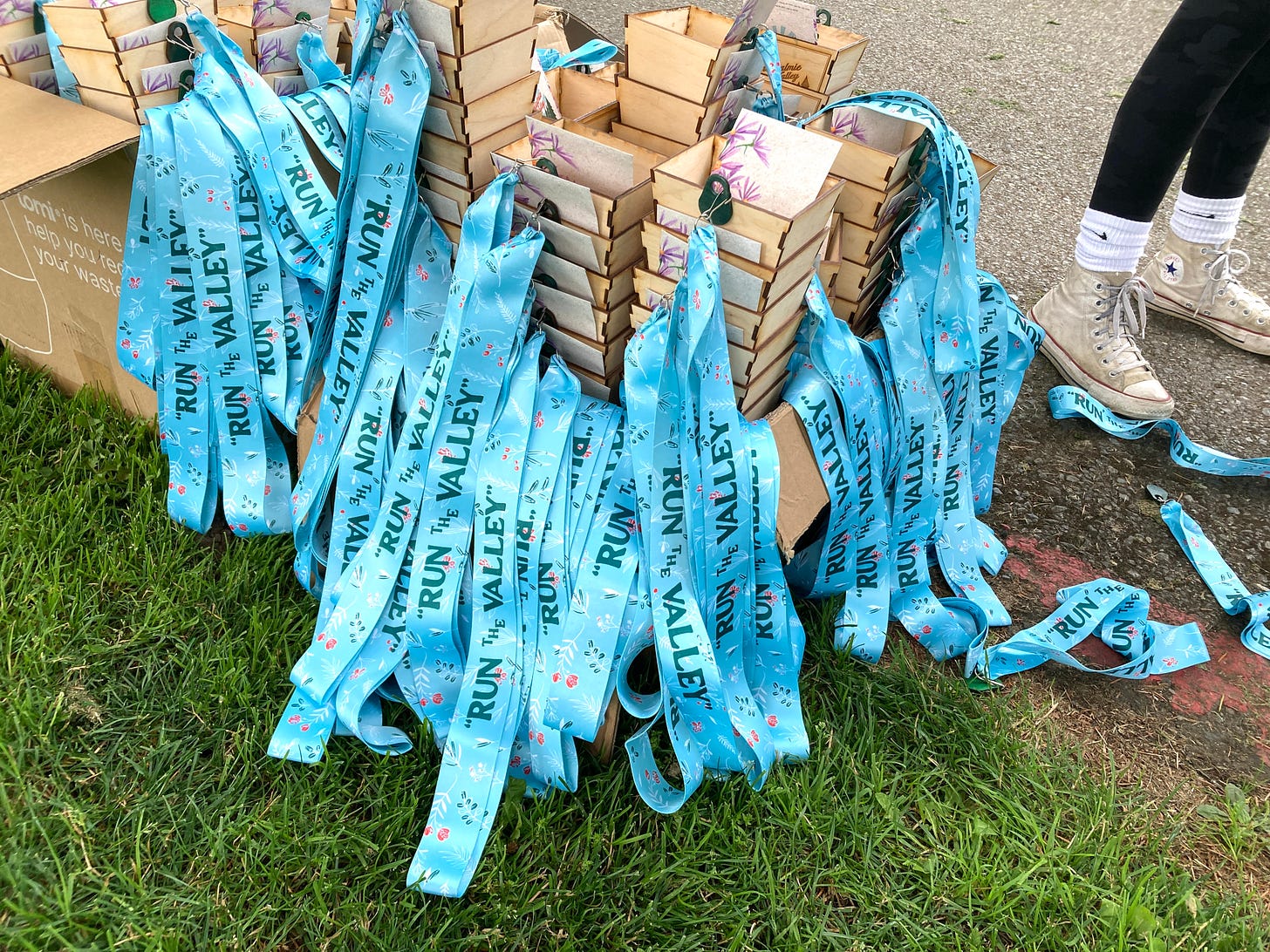What racing a 10k taught me about planning
On careful preparation and leaving room for magic
Your Five-Year Plan is a newsletter about embracing life’s profound uncertainty.
Maybe your own plans went up in flames; maybe you’re considering a big, scary leap. This is your trusty companion while you’re writing the next life chapter.
Welcome to the conversation—and to the adventure that unfolds when your plans go sideways. This is letter #12. ✨
☀️ How was your week?
Last week, paid subscribers received a special edition of the newsletter. We talked about the gifts we gave our Present and Future Selves in June. As for mine:
A $150 purchase that taught me how to use my mom’s last Christmas gift. You might remember the plein air watercolor class I mentioned here. This class helped me understand how to enjoy the art supplies my mom gave me before she got sick—and in doing so, strengthened my connection to her memory.
Becoming my own medical advocate, to the tune of $770. In June, I was reminded that it’s easy to talk a big game about placing value on something above all else—in this example, my health—while, at the same time, completely resenting some of the spending implications.
On to today’s letter!
What racing a 10k taught me about planning
2023 marks my twentieth year as a runner.
You’d be forgiven for imagining that, with a two-decade track record—no pun intended—I’m some kind of seasoned professional. But when it comes to running, I’ve always been more like Ferdinand the bull: traipsing around aimlessly in nature, reveling in the scenery, not concerned with much beyond enjoying my time outdoors.
My predilection for stopping (mid-run) to smell the roses hasn’t changed. But I have gotten curious about something.
I’ve self-identified as a “naturally slow runner” since I labored through my first one-mile time trial in middle school. I’ve completed races up through the marathon distance without ever setting a time goal; I didn’t want to disappoint myself.
Earlier this year, I started to wonder: what if the story I’ve been telling myself for decades…isn’t true? What if I’m not a “naturally slow runner,” but rather a runner who’s never trained to get faster?
If I was going to find out the answer, I knew I needed professional help.
Here’s where I give a massive shout-out to Nora, my running coach, of Lift Run Perform. She’s helping me uncover the latent athletic potential I’ve been neglecting for my entire life.
Working with a running coach has been a sabbatical budget splurge for me, to be sure—one that’s been worth every penny.
We started working together in January; when my mom passed away in February, the gentle structure and accountability of coaching helped get me out of the house and—literally and figuratively—back on my feet. Slowly but surely, Nora had me building a mileage base, and picking up the pace for interval workouts (like I’d read about in Runner’s World, but never actually attempted).
Soon, I was surprised to find myself itching to sign up for a race. First up? The Snoqualmie Valley 10k.
When you sign up for a race, and aim to run it as fast as possible, you’re also implicitly signing up for a couple of plans.
First, there’s the training plan, which you follow in the months before race day. It helps you hone your athletic abilities, and gets you to the starting line well-rested and injury-free.
That’s where the pacing plan picks up—a breakdown of how fast to run each mile in order to hit your goal time (a time that, ostensibly, your training plan prepared you for).
There’s also plenty of uncertainty involved on race day. How your anxiety—and the timing of your breakfast and coffee—affects your stomach. How your travel plans to the course unfold. Whether your legs feel fresh and your glycogen stores are topped up. Whether you timed your warmup correctly before the starting gun fires.
As you know, I write about the inherent tension between planning and uncertainty—and what happens when plans fall apart. In recent years, “plans falling apart” has held challenging connotations for me. “Plans falling apart” has been synonymous with adversity, loss, and grief.
But sometimes, these moments invite creativity and possibility. Sometimes, when a plan doesn’t unfold as expected, it creates enough room for magic to happen.
Since I’d never raced this (or any) distance, Nora gave me a pacing plan that walked a careful line between achievable and ambitious. The gist: start conservative, pick things up at each mile marker, but wait till the halfway point to consider pushing more aggressively. From mile 5 through the finish line, let loose if I had more to give.
I had my marching orders, with specific paces assigned to miles 1 through 6.2.
I followed the letter of the plan in mile 1, hitting my prescribed pace. But with each successive mile, I felt too good to hold myself back. I didn’t ditch the plan. Instead, I kept consulting it, checking my prescribed pace against my watch, and assessing how relaxed I felt. Each time I considered overriding the plan, I asked myself, “Can I hold this pace till the end?” If the answer was yes, I made the executive decision to accelerate.
The mile markers ticked by. My focus narrowed. I picked off runners ahead of me, making a game of it. By the time I reached the final stretch, I’d reached an all-out sprint. My goal had been to break one hour—a goal I wasn’t sure I could achieve!—and I’d finished in 55:28.
The pacing plan wasn’t wrong; it was a very well-educated guess. That’s the inherent nature of plans, though—they’re things you make ahead of time, with imperfect and incomplete information about a fundamentally unknowable future.
As the saying goes, “No plan survives first contact with the enemy.” That requires us to understand when and how to change tactics.
In this case, breaking from the plan allowed me to make full use of my training, to leave everything on the field, to make space for the magic of a finish-time possibility I hadn’t considered.
I can’t predict what my relationship with running will look like in the coming years. But here’s what I do know: I want to apply the lessons from this 10k to new areas of my life.
Plans fracture, both when we revise them proactively, and when they collapse under the stress of their own rigidity. And when they do, it just might be open season on abundance, potential, expansion.
💬 What do you think?
I’m curious to hear from you. Tell me about a time that deviating from your plans created space for magic.
Had your own plan-in-flames experience? Taking a leap into the unknown? I’d love to hear more. Just hit “reply” to get in touch, or introduce yourself here.
Warmly,
Maddie








Congrats on the achievement! I never liked running, maybe because I wasn't good at it. I needed to be dribbling or kicking a ball or else I'd get bored easily.
Wow,
This sounds like you accomplished a lot in your training, Maddie. Congratulations on the race!
Dad